nuclear
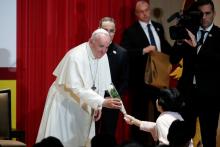
Pope Francis wrapped up a four-day trip to Japan on Tuesday by turning from the anti-nuclear message that was the backbone of his visit to other key campaigns of his, urging students to defend the earth and show greater compassion.
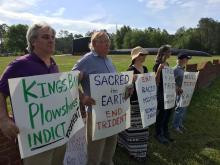
Just steps away from a decommissioned submarine buried in the ground near the main gate at the Kings Bay Naval Submarine Base in Georgia, anti-nuclear peace activists held a vigil Saturday morning to protest the U.S. nuclear arsenal and to show support for seven Catholic peace activists arrested early Thursday morning for unauthorized entry onto the base.
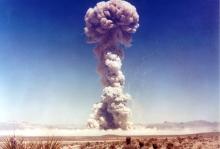
"It always requires two people, two separate actions, to launch, steal, sabotage, or tinker with an atomic warhead," Peter Zimmerman, nuclear physicist and State Department consultant wrote for USA Today. "This is the inviolable two-person rule intended to prevent misuse of a nuclear weapon."

Pope Francis is not an innovator in his approach to the topic of nuclear weapons (though he did extend the logic of earlier ethical thought). The consistent teaching of the Roman Catholic Church since Pope John XXIII has been that the use of nuclear weapons in war is immoral because it conflicts with the principles of just war theory. Problematically for the principles, the violence wrought through nuclear war is extensive enough that there can be plausible victor in a nuclear exchange, and no chance to protect noncombatants from becoming involved. In short, the church teaches, the use of nuclear weapons is indiscriminate and always disproportionate to the good that can be hoped to be achieved.
Pope Francis' whole papal agenda was brought into focus by Dr. Love when she summarized his mission as care for the three 'P's — his concern for the poor, for the planet, and for peace. Various elements of this are obvious from his Laudato Si', among other addresses and initiatives, but all three of these come together in Francis' concern to see a world free from the threat of nuclear weapons and potential of nuclear catastrophe.
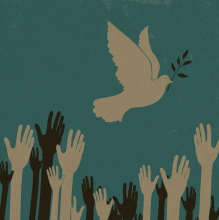
Here are the politics of the Iran nuclear deal: Congress returns next week from its summer recess, and among the first orders of business will be taking up the Joint Comprehensive Plan of Action on Iran’s nuclear program, recently negotiated with Iran in Vienna by the five permanent members of the United Nations Security Council plus Germany.
Opponents of the agreement had hoped to use the August break to sway undecided members of Congress. It didn’t happen. Instead, yesterday, Sen. Barbara Mikulski of Maryland became the 34th senator to publicly support the accord— meaning there are enough votes to sustain a presidential veto of any bill intended to kill it.
Now, here is a faith perspective: For Christians, this is a victory for peace and diplomacy over another bloody and destructive war. It is a time when common sense wins over bombast — when reality wins over rhetoric.

President Obama has secured the votes required to pass the Iran nuclear deal, reports The New York Times.
Senator Barbara Mikulski became the 34th Democrat in favor of the deal one day after Senators Chris Coons of Delaware and Bob Casey of Pennsylvania pledged their support.

Seventy years after the U.S. dropped an atomic bomb on the Japanese city of Nagasaki, Pope Francis on Aug. 9 described the bomb as a “lasting warning to humanity.”
Speaking to the faithful gathered in St. Peter’s Square, Francis recalled the “horror and repulsion” aroused by the twin bombings of Nagasaki on Aug. 9 1945, and Hiroshima, three days earlier.
“This (event) has become the symbol of mankind’s enormous destructive power when it makes a distorted use of scientific and technical progress,” he said.

The destruction of Hiroshima and Nagasaki, by any civilized standards, represented one of the moral low-points in human history. After all, by very conservative estimates, 135,000 people died from the atomic blasts—most of them civilians, the victims of the intentional targeting of cities. Think about that—these weren’t military targets, but cities full of men, women, and children, going about their lives, destroyed in seconds by the most destructive weapons ever invented.
But the point of memorializing isn’t about the past. It’s about ensuring such things happen “never again.”
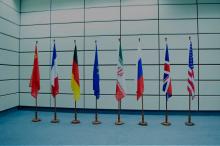
Later this week, President Obama will deliver a major speech promoting the Iran nuclear agreement at American University. I’m looking forward to the speech, both as an AU alum and someone closely following the upcoming Senate vote on the nuclear agreement. We know President Obama will make the strategic and scientific cases for the deal; I hope he makes the moral case as well.
President Obama has twice chosen the university in northwest D.C. to deliver major speeches, but it was also the site of President Kennedy’s landmark speech on peace and nuclear disarmament in 1963, where he declared, “While we proceed to safeguard our national interests, let us also safeguard human interests” and “the elimination of war and arms is clearly in the interest of both.”

Like many of my millennial peers, I was barely in diapers when the Cold War ended, never practiced fallout drills in school, and only recently learned what those yellow-and-black signs on old buildings meant. As a kid, if I thought about nukes at all, it was in a passive tense, World War II-history sort of way. In other words: not my problem.
But as we mark the 70th anniversary of Hiroshima and Nagasaki — when U.S. aircrafts dropped bombs on two Japanese cities, killing 135,000 people, by conservative estimates — I spent some time in the Sojourners archives trying to fill the gaps in my nuclear education. Here’s what I found.
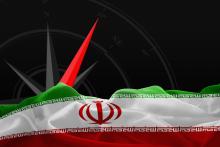
If politicians are letting one person trump the tone of politics, just to go up in the polls or get on the debate stage, that’s very bad news for our nation’s civil discourse.
It certainly isn’t serious talk. Serious talk is “Hard work.” “Difficult negotiations.” “Competing interests.” “Coalitions and diplomacy.” Serious talk recognizes that no agreement, no matter how diligently negotiated, is perfect.
Iran is an enemy – an enemy of America, an enemy of Israel, and an enemy of peace. I believe that. But you need to find ways to make peace with your enemies in order to reduce potential conflict. Choosing war with our enemies as our first option since 9/11 has just made us more enemies.
The question is: what we should do about Iran?

As we mark the 70th anniversary of the atomic bombings of Hiroshima and Nagasaki, the world waits to see if the Iran deal will come to fruition and thus avoid war. Once again, the debate about nuclear weapons appears at the forefront. At the same time, inside the U.S., the #BlackLivesMatter movement continues to make clear it will no longer be politics as usual as activists organize, protest, and fight every day to destroy institutional racism. However, it is no coincidence that these events are all happening simultaneously as they have always been and continue to be inextricably linked.

We have a deal. And many of us in the faith community are relieved.
After months of negotiations, missing deadlines, and many stressful final days in Vienna, Iran has agreed to halt its nuclear weapons program for a decade or more, and allow credible international agencies to significantly monitor its behavior. In return, sanctions against Iran will be lifted once it demonstrates compliance on its end. Meanwhile, the West is hopeful that a younger Iranian generation might begin to liberalize the country, prompting a fuller entry into the modern world over the next 10 years. That hope remains to be seen.
Many of us in the faith community have called for diplomacy instead of the only plausible alternative: war with Iran.
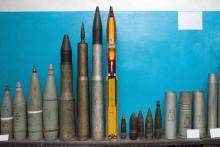
FOR NUCLEAR-WEAPONS watchers, the promise of the 2008 presidential campaign feels like a lifetime ago. Both Barack Obama and John McCain had endorsed the goal of a world without nuclear weapons. They were bolstered in doing so by the nonpartisan gravitas of four Cold War éminences grises who had rocked the foreign-policy establishment by arguing in The Wall Street Journal that nuclear deterrence couldn’t be trusted to keep the peace in the post-Cold War era. Instead, complete elimination of all nuclear weapons was the only way to ensure they would never again be used.
The promise of the campaign seemed to be confirmed by President Obama’s decision to declare, in a major speech in Prague within his first 100 days in office, that he “sought the peace and security of a world without nuclear weapons.” His subsequent Nobel Peace Prize was awarded, in no small part, for the promise of the Prague address.
It’s basically been downhill from that speech.
Yes, the 2010 New START agreement ensured continued bilateral reductions by the U.S. and Russia, which together possess more than 90 percent of global nuclear stockpiles (down to 16,000 from a peak of 65,000 in 1986). But New START didn’t change the fact that both countries still have enough weapons on high alert to devastate all life on the planet.

OVER THE LAST 14 months, I visited Nagasaki six times to prepare for and then participate in the Christian Forum for Reconciliation in Northeast Asia, along with 60 Christian leaders from Japan, the U.S., China, and South and North Korea.
Following the forum, I attended the International Symposium for Peacemaking in Northeast Asia, held at the Nagasaki Atomic Bomb Museum. These events gave me much opportunity to think about nuclear weapons and peacemaking, alone and together with a peaceable community of believers.
The devastating power unleashed on Nagasaki and Hiroshima 70 years ago shocked the human community. I have friends whose families suffered when atomic bombs fell on those two Japanese cities. But Japan was not simply a victim. The Pacific War started with the bombing of Pearl Harbor. And if the Japanese military had then had an atomic bomb, I am quite certain they would have used it.
Today, many are working to abolish nuclear weapons as inhumane and unacceptable. I am convinced that nuclear weapons cannot be justified. But the question “Why should we abolish nuclear weapons?” leads to additional questions: How do we think about wars, about killing and violence, in general? While seeking to abolish nuclear weapons, should we keep on making, selling, and using other kinds of weapons?

My new friends adhered to the “seamless garment” philosophy, also called the consistent life ethic, one committed to the protection of all human life, whether from war, poverty, racism, capital punishment, euthanasia, or abortion. One of them gave me a button that read “Peace begins in the womb,” and I pinned it to the bottom of the black leather motorcycle jacket I used to wear in those days.
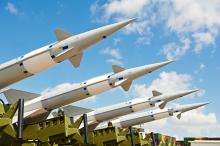
IN APRIL, eight nations, including Iran, announced an agreement for addressing Iran’s controversial nuclear activities. The Iran Nuclear Framework, supported by many Christian leaders in the U.S., is seen as an opportunity to “dramatically restrain the capacity of Iran to acquire nuclear weapons.” It could be one of the most significant nonproliferation achievements in history.
The proposed agreement significantly reduces Iran’s capacity to enrich uranium, closes the plutonium path to weapons capacity, and greatly increases international monitoring and verification of Iran’s nuclear infrastructure. It allows for lifting sanctions against Iran and opens the door to the possibility of improved bilateral relations.
The multiyear agreement sharply curtails Iran’s enrichment program. Iran has agreed to reduce by approximately two-thirds its installed centrifuges, from about 19,000 today to 6,104 under the deal. And Iran has agreed not to build any new facilities for the purpose of enriching uranium for 15 years.
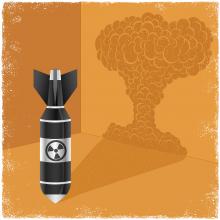
AS YOU READ this column, diplomats from the United States, the United Kingdom, France, Russia, China, Germany, and the European Union are working with their Iranian counterparts to finalize a deal concerning Iran’s nuclear program. I strongly believe that Christians should support the framework for this deal, announced in Lausanne, Switzerland, on April 2, as the best chance to prevent Iran from becoming a nuclear-armed state and—equally important—the best chance for the United States to avoid armed conflict with Iran.
In the days following the announcement of this framework, Sojourners authored and published a statement of support, which was signed by more than 50 Christian leaders (see statement here). Part of that statement reads as follows: “It is the sacred responsibility of all those entrusted with political power to pursue, with patient perseverance, every option that makes the destruction of war less possible, in order to protect human life and dignity. This becomes an even more urgent moral and spiritual imperative when we have the chance to prevent the further spread of nuclear weapons, with their terrifying potential of mass destruction ... a goal that reflects the binding commitments made by 191 U.N. member states, including the United States, under the Nuclear Non-Proliferation Treaty (NPT).”
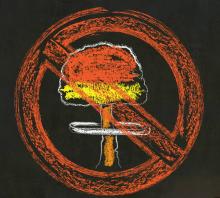
IMAGINE IF YOU will a world in which the most destructive weapons were “conventional” explosives. These bombs, often with nicknames such as “Daisy Cutter” or “bunker buster” or even the “Mother of All Bombs,” have enormous power: The Vietnam-era Daisy Cutter, one of the largest conventional weapons ever used, was designed to flatten a forest into a helicopter landing zone with a blast equal to about 15,000 pounds of TNT.
Now imagine that someone says, “Those conventional bombs aren’t destructive enough. Let’s invent a weapon a million times more powerful, one that releases radiation that magnifies the killing effects for generations. And let’s make 16,000 of those weapons.”
A sane world would respond, “You’ve gotta be kidding.”
But in the real world, it’s no joke.
Today, 70 years after the attacks on Hiroshima and Nagasaki in 1945, the world has 16,400 nuclear weapons—93 percent of them in the arsenals of the U.S. and Russia. The first H-bomb had the force of around 10 million tons of TNT, more than a million times as powerful as the worst conventional weapons.
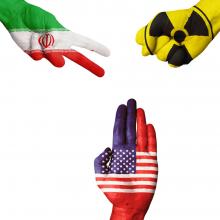
Iranians tend to trust religion far more than they do politics. Accordingly, it could be helpful to formulate a potentially helpful Track Two initiative around Iran’s openness to religion as a precursor to discussing important secular issues. One possibility that comes to mind, especially if the current negotiations lead to further openness, is what one might call a “peace game.” Since Iran has been the focus of any number of war games, this would represent a peacemaking counterpart. However, rather than a scenario-driven exercise as most war games tend to be, a peace game would be more akin to facilitated brainstorming.
The basic concept would call for bringing participants from Iran and the United States together for a week to discuss what the Iranians proposed earlier, i.e. how to overcome the obstacles that stand in the way of a cooperative relationship. Participants for the game would be chosen from the ranks of respected religious, political, academic, and professional figures who (1) are not in government, (2) are known to be spiritually minded, and (3) have views that would command serious consideration by their respective governments. A religious framework for the discussions would be established at the outset, a world-class expert on negotiations would facilitate the “game,” and the final recommendations would be presented to both governments for appropriate consideration.